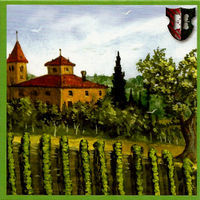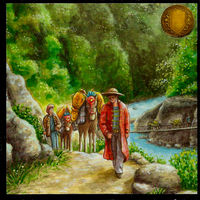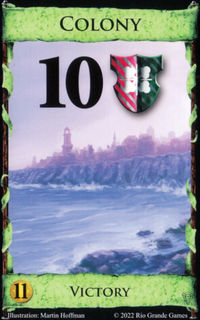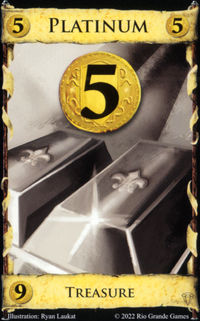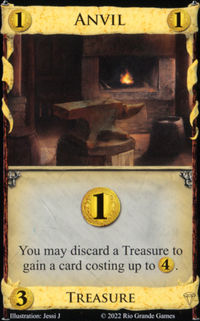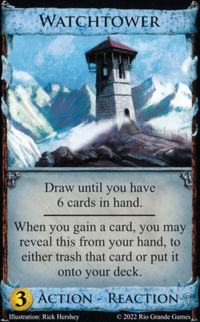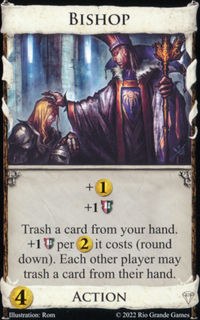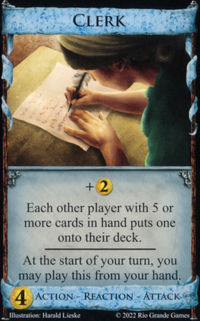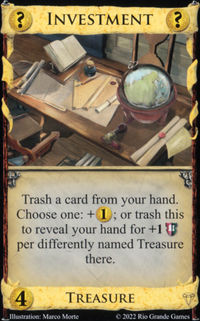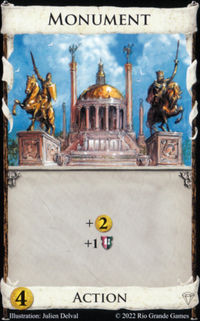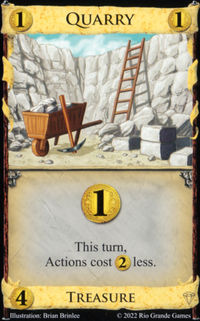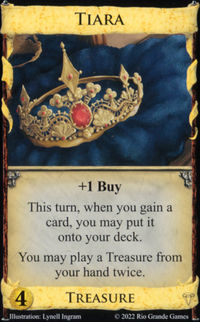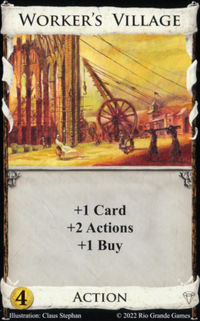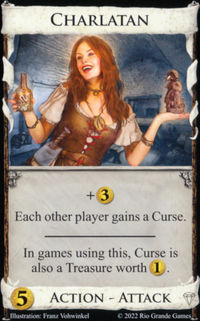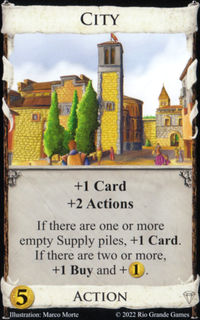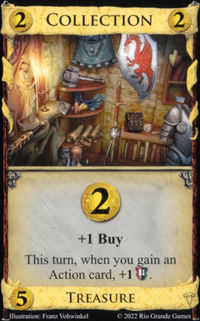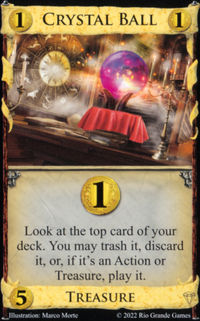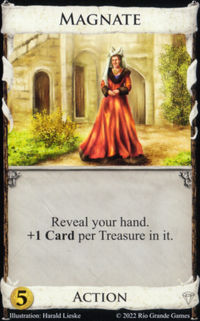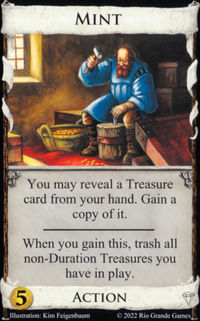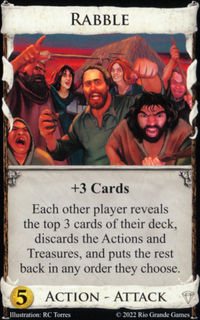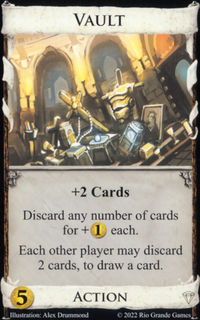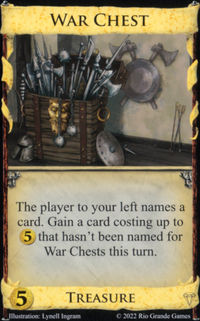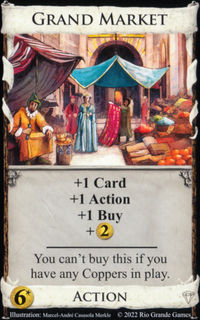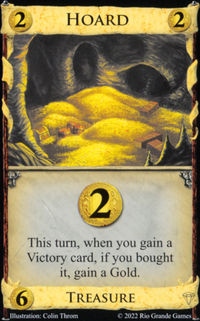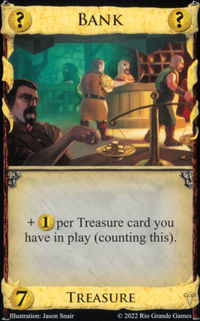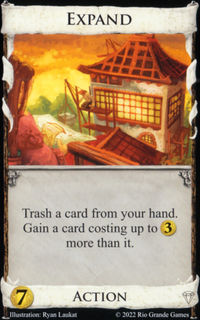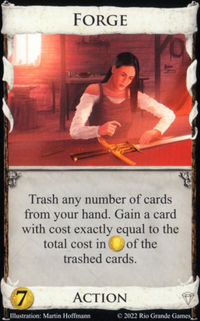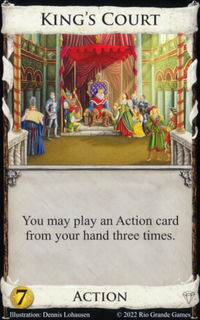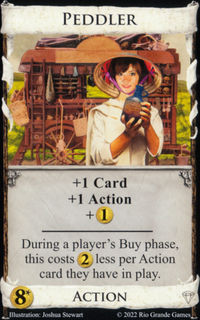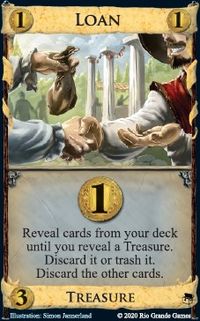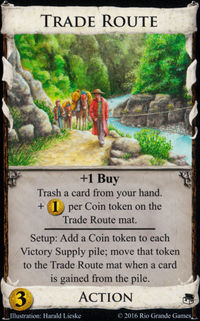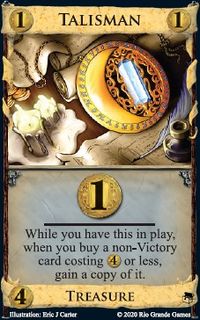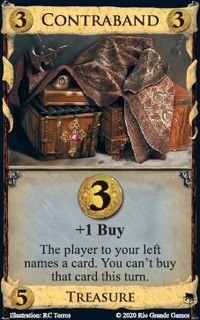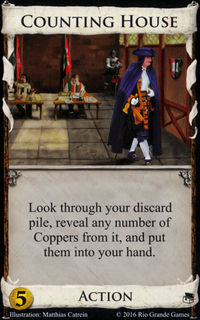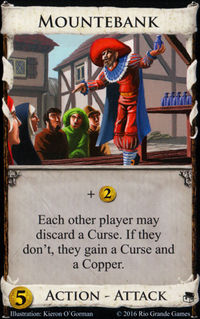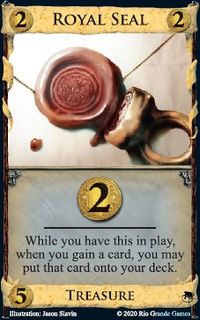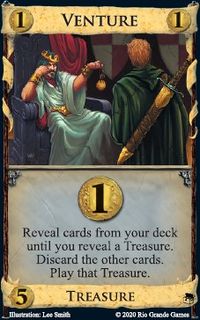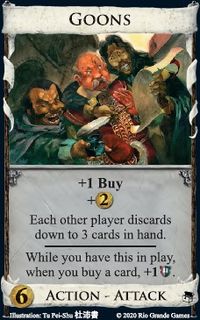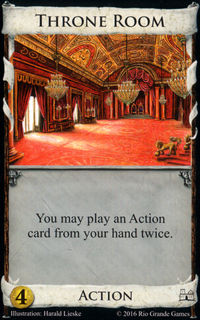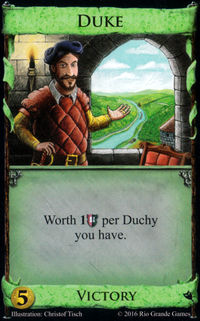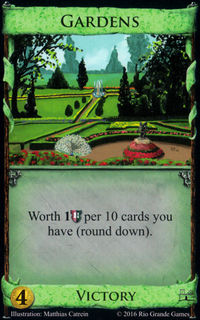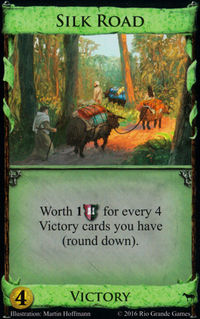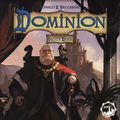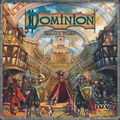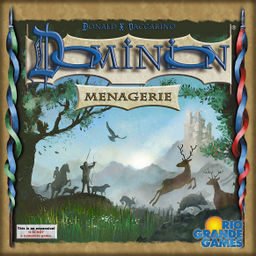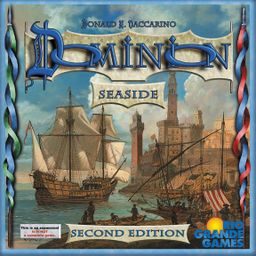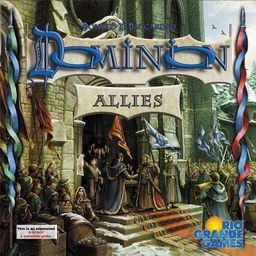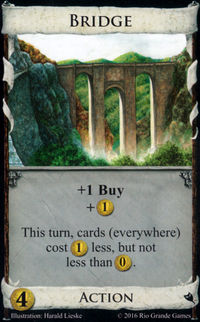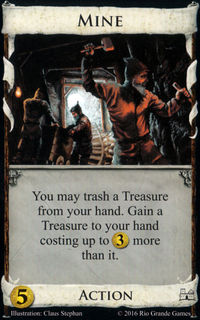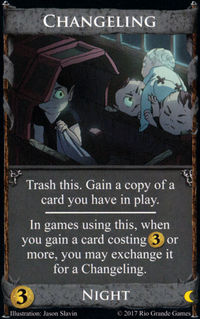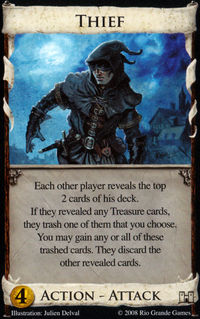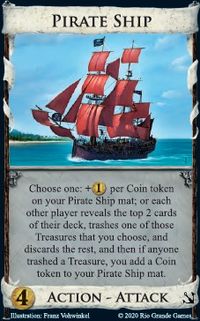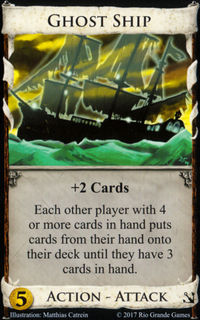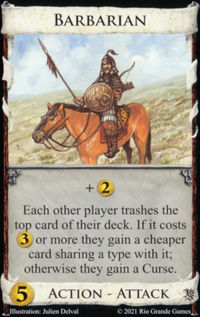Prosperity
| Prosperity | |
|---|---|
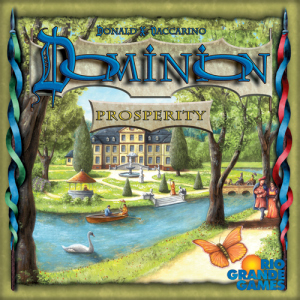 | |
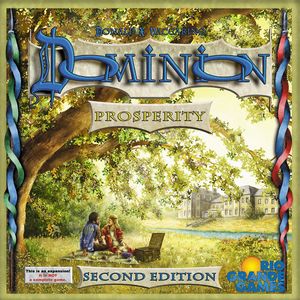 | |
| Info | |
| Type | Expansion |
| Icon |
|
| Cards | 300 |
|
250 (25 sets) | |
|
24 | |
|
25 | |
Blank Card(s) |
1 |
| Additional Material(s) | |
| |
| |
| Theme(s) |
|
| Release | October 2010 (1st) / June 2022 (2nd) |
| Cover artist | Harald Lieske (1st, 2nd) |
| Official Rulebook | |
Prosperity is the fourth Dominion expansion, released in October 2010. The box contains 25 sets of Kingdom cards. The basic conceptual theme of the set is wealth, focusing on Treasure cards and on expensive cards with powerful abilities. It is a full size expansion, and it is best known for featuring a variety of powerful game-changing cards, including the two new basic cards, Colony and Platinum, as well as cards that produce ![]() tokens. Prosperity also introduced the first Treasure cards that have effects in addition to simply providing +. It was the first expansion to feature cards costing , and the only one to have no cards costing . It thereby has the highest average card cost of all expansions.
tokens. Prosperity also introduced the first Treasure cards that have effects in addition to simply providing +. It was the first expansion to feature cards costing , and the only one to have no cards costing . It thereby has the highest average card cost of all expansions.
Prosperity (Second Edition) was released in June 2022. It contains 9 new sets of Kingdom cards, which are also available on their own as an update pack, to allow existing Prosperity sets to be updated to the second-edition form.
[edit] Contents
[edit] Basic Supply cards
[edit] Kingdom cards, second edition
Cards with an asterisk (*) were added in the second edition.
- : Anvil*, Watchtower
- : Bishop, Clerk*, Investment*, Monument, Quarry, Tiara*, Worker's Village
- : Charlatan*, City, Collection*, Crystal Ball*, Magnate*, Mint, Rabble, Vault, War Chest*
- : Grand Market, Hoard
- : Bank, Expand, Forge, King's Court
- : Peddler
[edit] Removed first-edition Kingdom cards
These cards were included in the first edition, and removed from the second edition.
- : Loan, Trade Route
- : Talisman
- : Contraband, Counting House, Mountebank, Royal Seal, Venture
- : Goons
[edit] Additional materials
Mats
- 8 Victory token mats (only in first edition)
- 1 Trade Route mat (only in first edition)
Tokens
- 31
 tokens
tokens
- 8 Coin tokens (only in first edition)
[edit] Additional first- and second-edition rules
[edit] Preparation
- Prosperity includes two new base cards, Platinum and Colony. You can include them whenever you want to; they are always used together. If you want to determine when to use them randomly, choose a random Kingdom card being used, and if it is from Prosperity, use Platinum and Colony. When used, they are in the Supply and can be bought and gained, but they do not take the place of Kingdom cards; you still have the usual 10 Kingdom cards. Use 8 copies of Colony for games with 2 players, 12 for games with 3 or more players. Use all 12 Platinums with any number of players.
- Prosperity has player mats for tracking
 tokens. You do not have to use one; if you do, take one when you first have
tokens. You do not have to use one; if you do, take one when you first have  tokens. There is also a mat for Trade Route. In games using Trade Route, put out the mat at the start of the game, and put a Coin token on each Victory card pile in the Supply.
tokens. There is also a mat for Trade Route. In games using Trade Route, put out the mat at the start of the game, and put a Coin token on each Victory card pile in the Supply.
[edit] Platinum and Colony
- In games using Platinum and Colony, there is an additional way the game can end. At the end of each turn, the game ends if one of these three conditions is met: the Supply pile of Province cards is empty OR any 3 Supply piles are empty (4 piles in a 5-6 player game) OR the Supply pile of Colony cards is empty.
[edit] Victory tokens
- The
 tokens are simply tokens that are worth
tokens are simply tokens that are worth  at the end of the game. They provide a way to score that is not cards in a player's deck.
at the end of the game. They provide a way to score that is not cards in a player's deck.
- They come in 1
 and 5
and 5  amounts; make change as needed. They are not counter-limited; use a replacement if you run out.
amounts; make change as needed. They are not counter-limited; use a replacement if you run out.
- Cards say "+1
 " (or other amounts) to indicate that a player takes
" (or other amounts) to indicate that a player takes  tokens. Cards that give +
tokens. Cards that give +  take the tokens from the pile of unused tokens, not from a player.
take the tokens from the pile of unused tokens, not from a player.
-
 tokens are not private; anyone can count them.
tokens are not private; anyone can count them.
[edit] Special Treasures
- Prosperity includes nine Treasure cards with rules on them. They are in the Supply if selected as one of the 10 Kingdom cards for the game; they are not part of the Basic Supply. They are just like normal Treasures, but have special abilities. They are played during the Buy phase like normal Treasures and are affected by cards that refer to Treasures.
- Players may play Treasure cards in any order, and may choose not to play some (or all) of the Treasure cards they have in hand. The order can matter; for example Bank counts Treasures played before it, and itself, but not Treasures played after it.
- During the Buy phase, playing Treasures comes strictly before buying cards; once a card is bought, no further Treasures can be played. This can be important, for example with Grand Market or Mint.
[edit] Flavor text
[edit] Cards gallery
[edit] Basic cards
[edit] Kingdom cards
[edit] Removed cards
[edit] Impact
Prosperity is a very popular expansion, as its themes lend very well to extravagant engines and frequent high-spending turns, which are usually quite a lot of fun to play. Most of the cards produce , and Prosperity-heavy games can result in ludicrously high amounts of ![]() being gained (at least compared to other expansions), including cards that can indefinitely continue to produce
being gained (at least compared to other expansions), including cards that can indefinitely continue to produce ![]() . It quite firmly grounded the strategic center of Dominion in engine decks, and it wasn't until the release of Hinterlands that this changed.
. It quite firmly grounded the strategic center of Dominion in engine decks, and it wasn't until the release of Hinterlands that this changed.
[edit] Game-changing cards
Prosperity is filled with incredibly powerful cards which often dominate the games they are a part of. Some of these include:
- City - Level 2 Cities are fantastic cards, offering +Actions, +Cards, and +.
- Goons - The
 chips and +Buy make Goons viable in both BM and engine games. Goons is capable of producing obscene scores well over 100
chips and +Buy make Goons viable in both BM and engine games. Goons is capable of producing obscene scores well over 100  .
.
- Grand Market - A powerful cantrip which players will often rush to grab.
- King's Court - Being able to play a card 3 times is invaluable, and players will often gladly trade a Province buy to grab a King's Court. Especially powerful when chained, as unlike Throne Room chaining allows a player to play more action cards using only a single action.
- Mountebank - One of the most powerful attacks in the game, it is capable of damaging an opponent's deck even after the Curse pile empties.
[edit] Victory tokens
The three ![]() token cards - Bishop, Monument and Goons - allow for the acquisition of
token cards - Bishop, Monument and Goons - allow for the acquisition of ![]() without gaining Victory cards. They are all quite popular cards, as well as strong ones, and can, in some cases, lead to stalemate game states where no player moves to end the game, because they can simply continue producing
without gaining Victory cards. They are all quite popular cards, as well as strong ones, and can, in some cases, lead to stalemate game states where no player moves to end the game, because they can simply continue producing ![]() indefinitely. Despite being such a small part of the set, they are usually thought of as one of the key themes of the expansion. All of them favor engine games, as they allow not only for decks without Treasures, but decks without any Victory cards to clog a trimmed engine.
indefinitely. Despite being such a small part of the set, they are usually thought of as one of the key themes of the expansion. All of them favor engine games, as they allow not only for decks without Treasures, but decks without any Victory cards to clog a trimmed engine.
[edit] Treasures
Despite having the most Kingdom Treasures of any set, the Treasures of Prosperity for the most part favor engine and combo play more than big money.
- Loan - trashes other Treasures to help jumpstart an engine
- Quarry - makes it much easier to purchase high-cost Actions
- Talisman - can pick up cheap engine parts quickly
- Contraband - terrible as a BM card, works best in Alt-VP strategies
- Royal Seal - allows for the immediate use of engine parts
- Bank - functions best with large handsizes, which engines provide most reliably
However, a minority of the Treasures are well-suited to BM strategies:
- Venture - an "engine" onto itself, but only with other Treasures
- Hoard - encourages BM play, though it can fit in certain engines
[edit] Colonies and Platinum
Colonies and Platinum impact the games they are present in in a variety of ways.
- Longer Games - Colony games typically last longer than Province games, as it is more difficult to build to the required to buy a Colony.
- Engine Viability - Because games are typically longer, engines tend to be more viable than BM strategies in Colony games.
- Alternate VP - Alt-VP are typically less viable in Colony games, as the 10
 of a Colony is often large enough to offset the massed
of a Colony is often large enough to offset the massed  you will see from cards such as Duke, Gardens, or Silk Road.
you will see from cards such as Duke, Gardens, or Silk Road.
[edit] Theme
Game designer Donald X. offered some insight into some themes of the set here.
- 8 Special Treasure: Loan, Quarry, Talisman, Contraband, Royal Seal, Venture, Hoard, Bank (Platinum)
- 7 Treasure interaction: Counting House, Mint, Mountebank, Venture, Grand Market, Hoard, Bank
- 5 Non-attack player interaction: Trade Route, Bishop, City, Contraband, Vault
- 3 VP tokens: Bishop, Monument, Goons
- 8 Expensive: Goons, Grand Market, Hoard, Bank, Expand, Forge, King's Court, Peddler (Platinum, Colony)
[edit] Alternate versions
Polish First Edition (by GFP)
Polish Second Edition (by IUVI Games)
[edit] Trivia
Prosperity was the only expansion to feature Kingdom Cards costing until the release of Menagerie.
[edit] In other languages
- Czech: Prosperita
- Dutch: Welvaart
- Finnish: Nousukausi (lit. upswing)
- French: Prospérité
- German: Blütezeit (lit. flowering time, fig. Golden Age)
- Italian: Prosperità
- Japanese: 繁栄 (pron. han'ei)
- Polish: Złoty wiek (lit. golden age)
- Russian: Процветание (pron. protsvyetaniye)
- Spanish: Prosperidad
[edit] Secret History (1E)
Rather than a card-by-card breakdown, Prosperity's Secret History was originally written as a version-by-version look at the set as a whole. That version can still be viewed here, but Donald X. has provided it to the community in the same format as the other Histories to accomodate this wiki. [1]
I made Dominion. It gradually got more cards. One day I divided up the cards into a main set, a first expansion, and a second expansion. Then I moved on! My friends just wanted to play Dominion though. Okay; I could make some more Dominion expansions.
I asked my friend Molly if there was a theme she'd like to see. She said "spendy." And spendy I gave her.
Initially the set's themes were: spendy, in particular Platinum/Colony; cards caring about treasures; treasures that did something when spent; and actions that let you spend money to do things. At the time the set was just 18 cards, including Platinum/Colony. Intrigue and Seaside/Hinterlands were both 15, but counting Platinum/Colony in 15 cards seemed too small, and then a page holds 9 cards. So, 18. Then I decided the sets were too small and upped them all to 20; then during work on the published version I tried all of the sets at 16 cards briefly, then finally up to 25.
The spendy theme got fleshed out by having four cards costing , and nothing costing . Seaside got extra 's to compensate. Cards caring about treasures remained a minor theme. I added more treasures that did things, but changed "when spent" to "when played," to deal with rules questions, while having some treasures do things "while in play." The actions that let you spend money died; they weren't compelling and anyway Black Market confused some people.
I added a non-attack interaction subtheme. The set needed interaction, like any set, but it had trouble with attacks. Attacks slow down the game and push you away from buying Colonies. But this is the set with Colonies, you want those to be reachable. So in the end the set only has 3 attacks, but it has 5 non-attacks that interact (not counting Watchtower).
I also added the VP tokens. Monument hadn't always been in the set, and then at one point left, tentatively slated for Dark Ages. I brought it back as a thing people liked that seemed to fit well. I knew tokens would be used for Monument, and also that people would be disappointed if it was the only card that used them (Seaside just had one use per token type because the set did not originally use tokens). In the end I managed to have three cards that used them.
Prosperity was initially the third expansion. Around the time work on it was almost done, it turned out that the powers that be wanted small expansions, and could the next one be small? So Prosperity got put on hold while I worked on Alchemy. This gave it extra time to get extra polished. Bishop and Goons came out of that period, and various small tweaks.[edit] Retrospective (1E)
[edit] Secret History (2E)
I guess I can talk about a few outtakes.
- "Trash up to 2 cards from your hand. Then if you have no cards in hand, gain a Gold." I liked it. It's true that it didn't proc very often. It tried out for Allies too.
- "+1 Buy, If you have at least , + and +1 ![]() ." A Treasure for . If the cards just had to look pretty when you read them, it would have been a shoe-in for the set. Sadly they also have to play well.
." A Treasure for . If the cards just had to look pretty when you read them, it would have been a shoe-in for the set. Sadly they also have to play well.
- Some treasures tried to get out of the way of your draw, until you wanted them. There were multiple approaches here that did not fly.
- There was a Bridge Treasure for non-Actions. A counterpart to Quarry.
- There were Mine variants. There was a Changeling Treasure. There was a one-shot Copper that turned into a Gold (another throwback to a card from early versions of Prosperity). There was a Treasure with a built-in Event ("may pay to...").
- One I especially remember was a Treasure worth that gained a Copper onto your deck. It turns out that + is a lot.[edit] Attack cards in the second edition sets
[edit] Recommended sets of 10
Old kingdoms can be found here.
[edit] Prosperity only
| Beginners [images] | ||||||||||||||
|---|---|---|---|---|---|---|---|---|---|---|---|---|---|---|
| Bank | Clerk | Crystal Ball | Expand | Magnate | ||||||||||
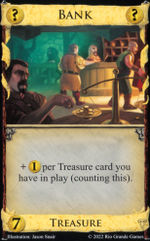
|
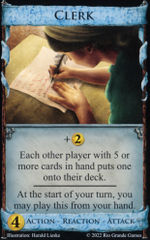
|
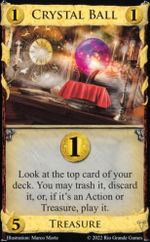
|
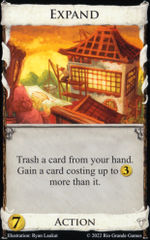
|
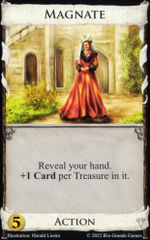
| ||||||||||
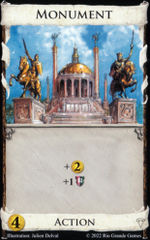
|
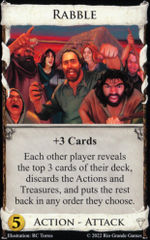
|

|
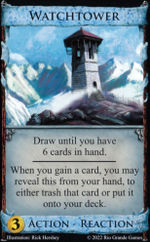
|
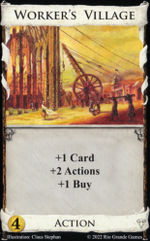
| ||||||||||
| Monument | Rabble | Tiara | Watchtower | Worker's Village | ||||||||||
| Landscapes and Additional Cards | ||||||||||||||
| Platinum | Colony | |||||||||||||
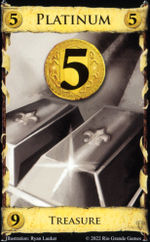
|
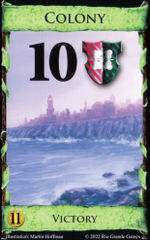
| |||||||||||||
| Friendly Interactive [images] | ||||||||||||||
|---|---|---|---|---|---|---|---|---|---|---|---|---|---|---|
| Bishop | City | Collection | Forge | Hoard | ||||||||||
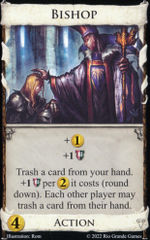
|
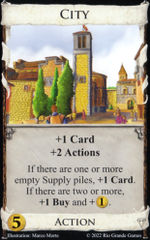
|
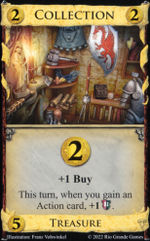
|
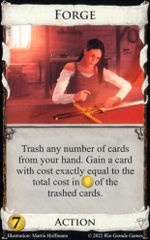
|
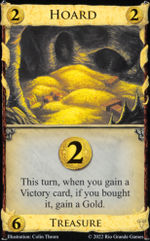
| ||||||||||
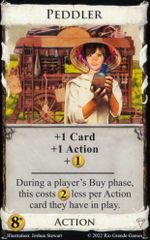
|

|
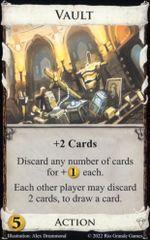
|
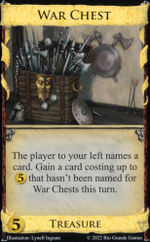
|

| ||||||||||
| Peddler | Tiara | Vault | War Chest | Worker's Village | ||||||||||
| Landscapes and Additional Cards | ||||||||||||||
| Platinum | Colony | |||||||||||||

|

| |||||||||||||
[edit] Prosperity & Dominion
| Biggest Money [images] | ||||||||||||||
|---|---|---|---|---|---|---|---|---|---|---|---|---|---|---|
| Artisan | Harbinger | Laboratory | Mine | Moneylender | ||||||||||
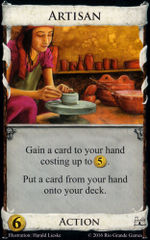
|
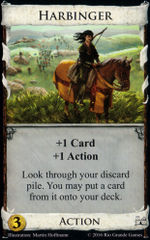
|
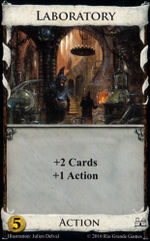
|
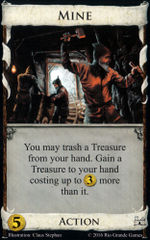
|

| ||||||||||

|

|
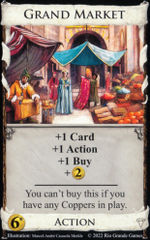
|
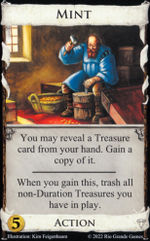
|

| ||||||||||
| Bank | Crystal Ball | Grand Market | Mint | Tiara | ||||||||||
| Landscapes and Additional Cards | ||||||||||||||
| Platinum | Colony | |||||||||||||

|

| |||||||||||||
| The King's Army [images] | ||||||||||||||
|---|---|---|---|---|---|---|---|---|---|---|---|---|---|---|
| Bureaucrat | Council Room | Merchant | Moat | Village | ||||||||||
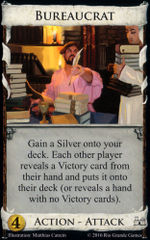
|
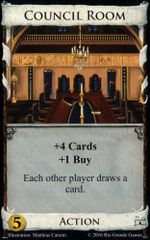
|
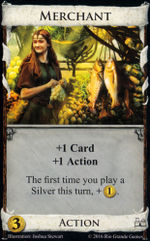
|
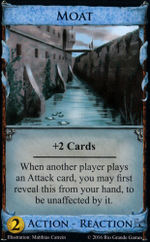
|
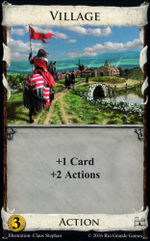
| ||||||||||

|

|

|

|

| ||||||||||
| Collection | Expand | King's Court | Rabble | Vault | ||||||||||
| Landscapes and Additional Cards | ||||||||||||||
| Platinum | Colony | |||||||||||||

|

| |||||||||||||
[edit] Prosperity & Intrigue
| Paths to Victory [images] | ||||||||||||||
|---|---|---|---|---|---|---|---|---|---|---|---|---|---|---|
| Bishop | Collection | Magnate | Monument | Peddler | ||||||||||

|

|

|

|

| ||||||||||
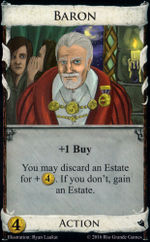
|
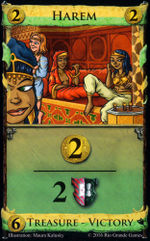
|
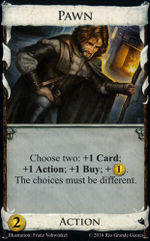
|
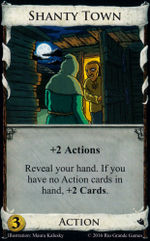
|
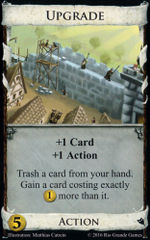
| ||||||||||
| Baron | Harem | Pawn | Shanty Town | Upgrade | ||||||||||
| Landscapes and Additional Cards | ||||||||||||||
| Platinum | Colony | |||||||||||||

|

| |||||||||||||
| Lucky Seven [images] | ||||||||||||||
|---|---|---|---|---|---|---|---|---|---|---|---|---|---|---|
| Bank | Expand | Forge | King's Court | Vault | ||||||||||

|

|

|

|

| ||||||||||
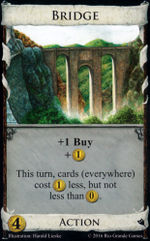
|
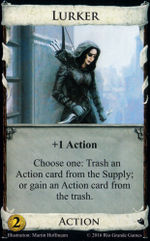
|
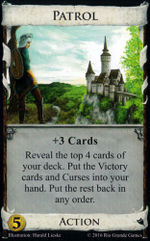
|
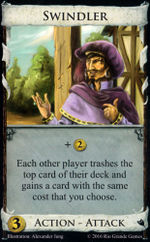
|
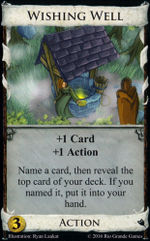
| ||||||||||
| Bridge | Lurker | Patrol | Swindler | Wishing Well | ||||||||||
| Landscapes and Additional Cards | ||||||||||||||
| Platinum | Colony | |||||||||||||

|

| |||||||||||||
[edit] Prosperity & Seaside
| Exploding Kingdom [images] | ||||||||||||||
|---|---|---|---|---|---|---|---|---|---|---|---|---|---|---|
| Bishop | City | Grand Market | King's Court | Quarry | ||||||||||

|

|

|

|
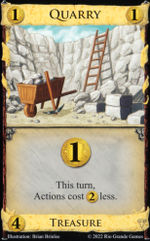
| ||||||||||
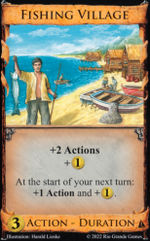
|
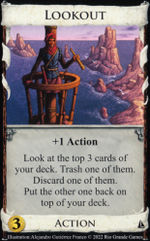
|
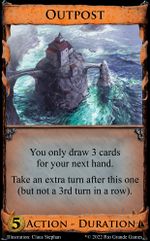
|
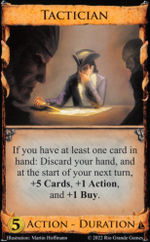
|
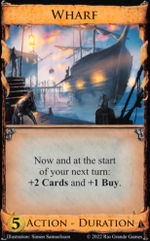
| ||||||||||
| Fishing Village | Lookout | Outpost | Tactician | Wharf | ||||||||||
| Landscapes and Additional Cards | ||||||||||||||
| Platinum | Colony | |||||||||||||

|

| |||||||||||||
| Pirate Bay [images] | ||||||||||||||
|---|---|---|---|---|---|---|---|---|---|---|---|---|---|---|
| Charlatan | Hoard | Investment | Magnate | Mint | ||||||||||
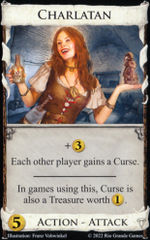
|

|
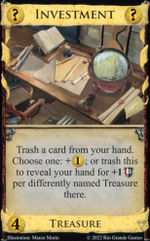
|

|

| ||||||||||
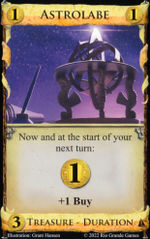
|
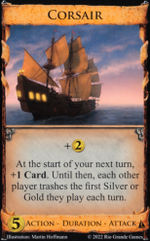
|
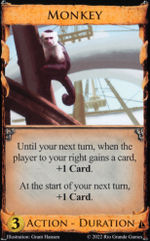
|
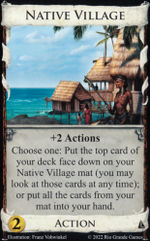
|
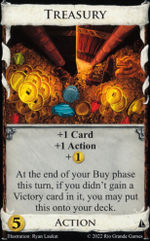
| ||||||||||
| Astrolabe | Corsair | Monkey | Native Village | Treasury | ||||||||||
| Landscapes and Additional Cards | ||||||||||||||
| Platinum | Colony | |||||||||||||

|

| |||||||||||||
[edit] Prosperity & Alchemy
| Lower Learning [images] | ||||||||||||||
|---|---|---|---|---|---|---|---|---|---|---|---|---|---|---|
| Anvil | Bishop | Charlatan | Mint | Worker's Village | ||||||||||
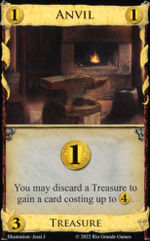
|

|

|

|

| ||||||||||

|

|
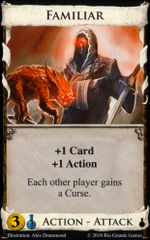
|
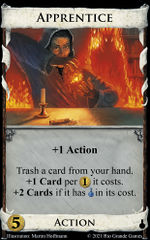
|
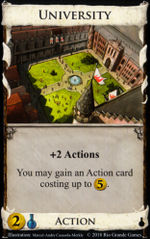
| ||||||||||
| Peddler | Vault | Familiar | Apprentice | University | ||||||||||
| Landscapes and Additional Cards | ||||||||||||||
| Potion | Platinum | Colony | ||||||||||||
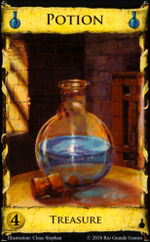
|

|

| ||||||||||||
[edit] Prosperity & Guilds/Cornucopia
| Detours [images] | ||||||||||||||
|---|---|---|---|---|---|---|---|---|---|---|---|---|---|---|
| Clerk | Crystal Ball | Forge | Hoard | Magnate | ||||||||||

|

|

|

|

| ||||||||||
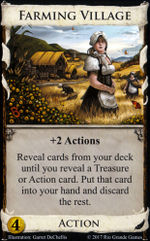
|
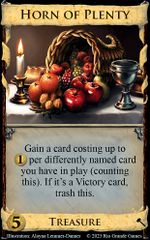
|
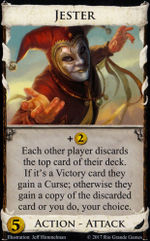
|
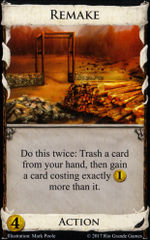
|
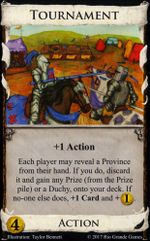
| ||||||||||
| Farming Village | Horn of Plenty | Jester | Remake | Tournament | ||||||||||
| Landscapes and Additional Cards | ||||||||||||||
| Platinum | Colony | |||||||||||||

|

| |||||||||||||
| Quarrymen [images] | ||||||||||||||
|---|---|---|---|---|---|---|---|---|---|---|---|---|---|---|
| Charlatan | City | Expand | Grand Market | Quarry | ||||||||||

|

|

|

|

| ||||||||||
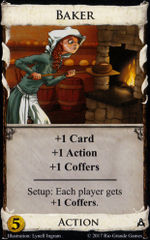
|
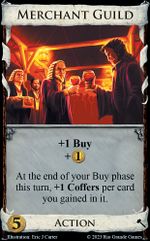
|
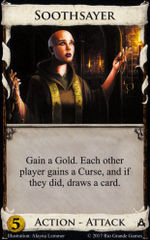
|
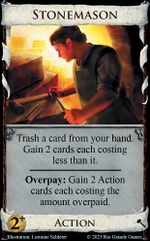
|
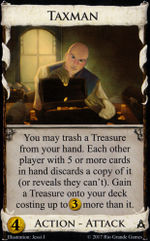
| ||||||||||
| Baker | Merchant Guild | Soothsayer | Stonemason | Taxman | ||||||||||
| Landscapes and Additional Cards | ||||||||||||||
| Platinum | Colony | |||||||||||||

|

| |||||||||||||
[edit] Prosperity & Hinterlands
| Instant Gratification [images] | ||||||||||||||
|---|---|---|---|---|---|---|---|---|---|---|---|---|---|---|
| Bishop | Expand | Hoard | Mint | Watchtower | ||||||||||

|

|

|

|

| ||||||||||
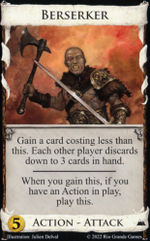
|
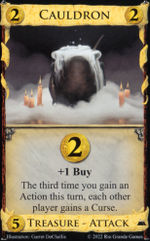
|
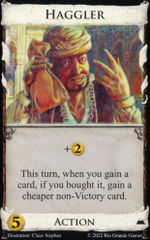
|
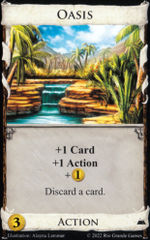
|
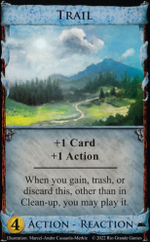
| ||||||||||
| Berserker | Cauldron | Haggler | Oasis | Trail | ||||||||||
| Landscapes and Additional Cards | ||||||||||||||
| Platinum | Colony | |||||||||||||

|

| |||||||||||||
| Treasure Trove [images] | ||||||||||||||
|---|---|---|---|---|---|---|---|---|---|---|---|---|---|---|
| Bank | Clerk | Crystal Ball | Monument | Tiara | ||||||||||

|

|

|

|

| ||||||||||

|
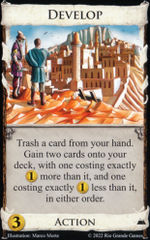
|

|
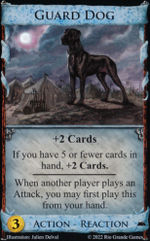
|
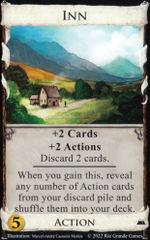
| ||||||||||
| Cauldron | Develop | Fool's Gold | Guard Dog | Inn | ||||||||||
| Landscapes and Additional Cards | ||||||||||||||
| Platinum | Colony | |||||||||||||

|

| |||||||||||||
[edit] Prosperity & Dark Ages
| One Man's Trash [images] | |||||||||||||||||
|---|---|---|---|---|---|---|---|---|---|---|---|---|---|---|---|---|---|
| Anvil | City | Crystal Ball | Magnate | War Chest | |||||||||||||

|

|

|

|

| |||||||||||||
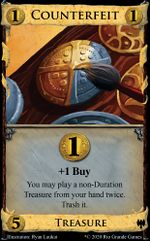
|
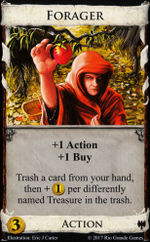
|
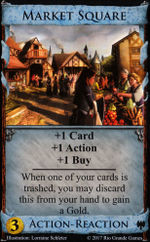
|
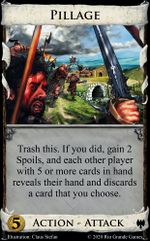
|
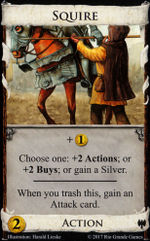
| |||||||||||||
| Counterfeit | Forager | Market Square | Pillage | Squire | |||||||||||||
| Landscapes and Additional Cards | |||||||||||||||||
| Platinum | Colony | Shelters | |||||||||||||||

|

|
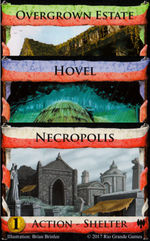
| |||||||||||||||
| Honor Among Thieves [images] | |||||||||||||||||
|---|---|---|---|---|---|---|---|---|---|---|---|---|---|---|---|---|---|
| Collection | Forge | Hoard | Quarry | Watchtower | |||||||||||||

|

|

|

|

| |||||||||||||
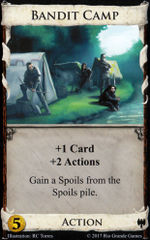
|
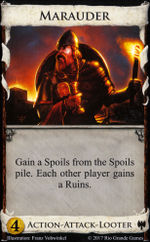
|
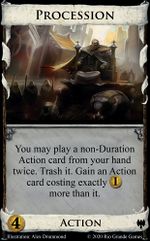
|
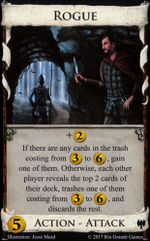
|

| |||||||||||||
| Bandit Camp | Marauder | Procession | Rogue | Squire | |||||||||||||
| Landscapes and Additional Cards | |||||||||||||||||
| Platinum | Colony | Ruins | Shelters | ||||||||||||||

|

|
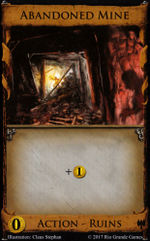
|

| ||||||||||||||
[edit] Prosperity & Adventures
| Last Will and Monument [images] | |||||||||||||||||
|---|---|---|---|---|---|---|---|---|---|---|---|---|---|---|---|---|---|
| Bishop | Collection | Magnate | Monument | Vault | |||||||||||||

|

|

|

|

| |||||||||||||
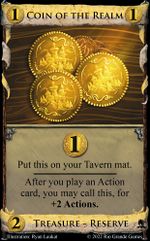
|
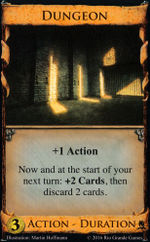
|
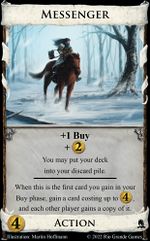
|
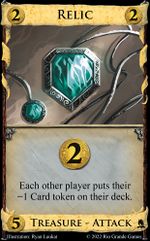
|
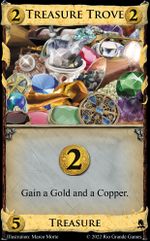
| |||||||||||||
| Coin of the Realm | Dungeon | Messenger | Relic | Treasure Trove | |||||||||||||
| Landscapes and Additional Cards | |||||||||||||||||
| Platinum | Colony | Inheritance | |||||||||||||||

|

|

| |||||||||||||||
| Think Big [images] | ||||||||||||||||||||
|---|---|---|---|---|---|---|---|---|---|---|---|---|---|---|---|---|---|---|---|---|
| Expand | Hoard | King's Court | Peddler | War Chest | ||||||||||||||||

|

|

|

|

| ||||||||||||||||
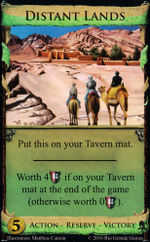
|
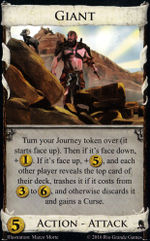
|
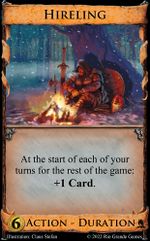
|
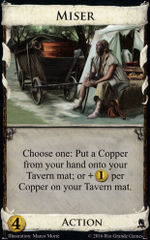
|
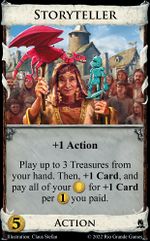
| ||||||||||||||||
| Distant Lands | Giant | Hireling | Miser | Storyteller | ||||||||||||||||
| Landscapes and Additional Cards | ||||||||||||||||||||
| Platinum | Colony | Ball | Ferry | |||||||||||||||||

|

|

|

| |||||||||||||||||
[edit] Prosperity & Empires
| Big Time [images] | ||||||||||||||||||||
|---|---|---|---|---|---|---|---|---|---|---|---|---|---|---|---|---|---|---|---|---|
| Capital | Gladiator | Patrician | Royal Blacksmith | Villa | ||||||||||||||||
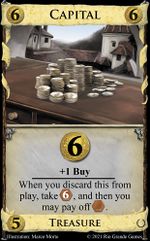
|

|
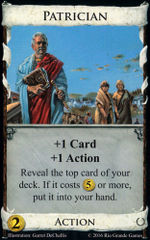
|
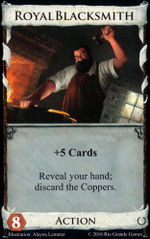
|
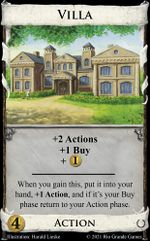
| ||||||||||||||||

|

|

|

|

| ||||||||||||||||
| Bank | Forge | Grand Market | Investment | Tiara | ||||||||||||||||
| Landscapes and Additional Cards | ||||||||||||||||||||
| Platinum | Colony | Dominate | Obelisk | |||||||||||||||||

|

|

|

| |||||||||||||||||
| Gilded Gates [images] | ||||||||||||||||||||
|---|---|---|---|---|---|---|---|---|---|---|---|---|---|---|---|---|---|---|---|---|
| Chariot Race | City Quarter | Encampment | Groundskeeper | Wild Hunt | ||||||||||||||||
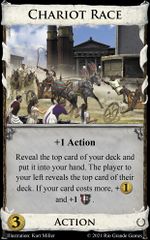
|
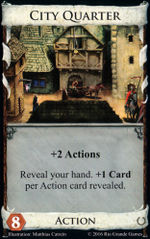
|
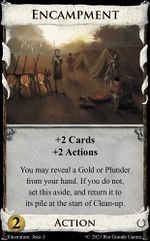
|
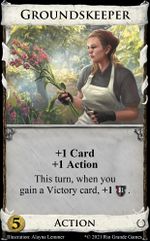
|
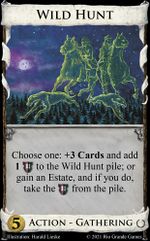
| ||||||||||||||||

|

|

|

|

| ||||||||||||||||
| Anvil | Collection | Mint | Peddler | War Chest | ||||||||||||||||
| Landscapes and Additional Cards | ||||||||||||||||||||
| Platinum | Colony | Basilica | Palace | |||||||||||||||||

|

|

|

| |||||||||||||||||
[edit] Prosperity & Nocturne
| Treasures of the Night [images] | ||||||||||||||
|---|---|---|---|---|---|---|---|---|---|---|---|---|---|---|
| Crypt | Guardian | Night Watchman | Raider | Vampire | ||||||||||
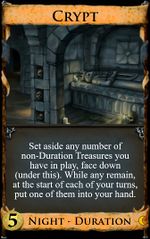
|
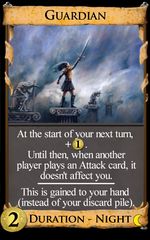
|
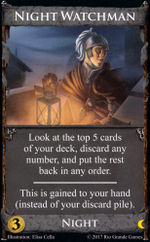
|
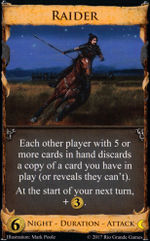
|
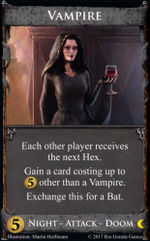
| ||||||||||

|

|

|

|

| ||||||||||
| Charlatan | Crystal Ball | Investment | Tiara | War Chest | ||||||||||
| Landscapes and Additional Cards | ||||||||||||||
| Platinum | Colony | Hexes | ||||||||||||

|

|

| ||||||||||||
| Day at the Races [images] | ||||||||||||||
|---|---|---|---|---|---|---|---|---|---|---|---|---|---|---|
| Blessed Village | Cemetery | Druid | Tormentor | Tragic Hero | ||||||||||
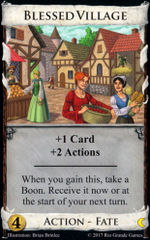
|
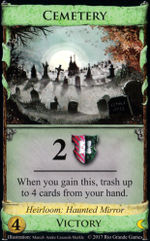
|
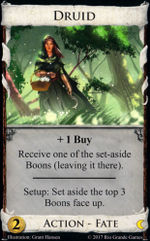
|
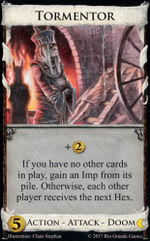
|
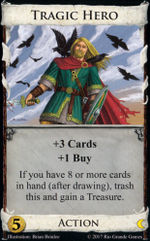
| ||||||||||

|

|

|

|

| ||||||||||
| Anvil | Bishop | Clerk | Peddler | Watchtower | ||||||||||
| Landscapes and Additional Cards | ||||||||||||||
| Platinum | Colony | Boons | Hexes | |||||||||||

|

|

|

| |||||||||||
| Boons for Druid | ||||||||||||||
| The Swamp's Gift | The River's Gift | The Forest's Gift | ||||||||||||

|

|

| ||||||||||||
[edit] Prosperity & Renaissance
| Dreamers of Dreams [images] | |||||||||||||||||
|---|---|---|---|---|---|---|---|---|---|---|---|---|---|---|---|---|---|
| Cargo Ship | Old Witch | Priest | Scepter | Scholar | |||||||||||||
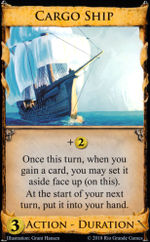
|
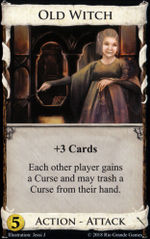
|
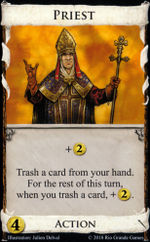
|
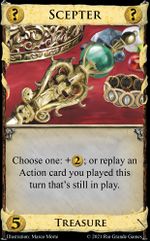
|
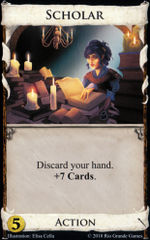
| |||||||||||||

|

|

|

|

| |||||||||||||
| Charlatan | Monument | Vault | Watchtower | Worker's Village | |||||||||||||
| Landscapes and Additional Cards | |||||||||||||||||
| Platinum | Colony | Academy | |||||||||||||||

|

|

| |||||||||||||||
| Movers and Shakers [images] | |||||||||||||||||||||||
|---|---|---|---|---|---|---|---|---|---|---|---|---|---|---|---|---|---|---|---|---|---|---|---|
| Hideout | Patron | Research | Treasurer | Villain | |||||||||||||||||||
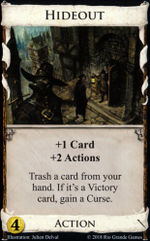
|

|
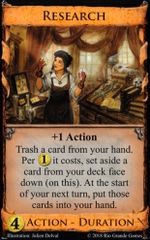
|
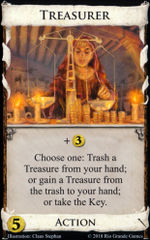
|
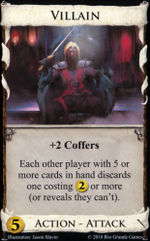
| |||||||||||||||||||

|

|

|

|

| |||||||||||||||||||
| Bank | City | Grand Market | Investment | Rabble | |||||||||||||||||||
| Landscapes and Additional Cards | |||||||||||||||||||||||
| Platinum | Colony | Capitalism | Citadel | Key | |||||||||||||||||||

|

|

|

|

| |||||||||||||||||||
[edit] Prosperity & Menagerie
| Limited Time Offer [images] | ||||||||||||||||||||
|---|---|---|---|---|---|---|---|---|---|---|---|---|---|---|---|---|---|---|---|---|
| Destrier | Displace | Fisherman | Supplies | Wayfarer | ||||||||||||||||
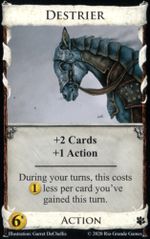
|
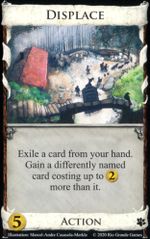
|
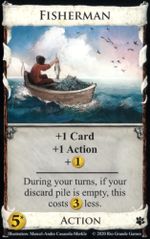
|
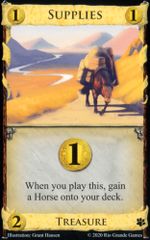
|
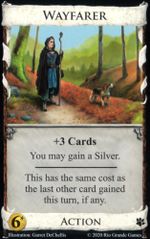
| ||||||||||||||||

|

|

|

|

| ||||||||||||||||
| Anvil | Grand Market | Mint | Peddler | Worker's Village | ||||||||||||||||
| Landscapes and Additional Cards | ||||||||||||||||||||
| Platinum | Colony | Desperation | Way of the Frog | |||||||||||||||||

|

|

|

| |||||||||||||||||
| Otter Chaos [images] | ||||||||||||||||||||
|---|---|---|---|---|---|---|---|---|---|---|---|---|---|---|---|---|---|---|---|---|
| Animal Fair | Camel Train | Mastermind | Paddock | Stockpile | ||||||||||||||||
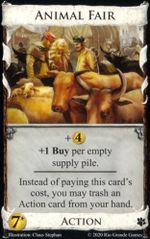
|
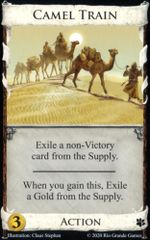
|
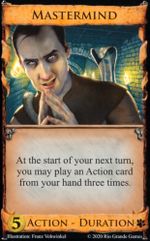
|
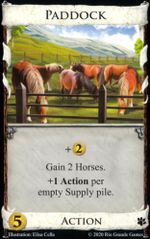
|

| ||||||||||||||||

|

|

|

|

| ||||||||||||||||
| City | Clerk | Monument | Quarry | War Chest | ||||||||||||||||
| Landscapes and Additional Cards | ||||||||||||||||||||
| Platinum | Colony | Reap | Way of the Otter | |||||||||||||||||

|

|

|

| |||||||||||||||||
[edit] Prosperity & Allies
| Inventing Mania [images] | |||||||||||||||||
|---|---|---|---|---|---|---|---|---|---|---|---|---|---|---|---|---|---|
| Augurs | Bauble | Capital City | Carpenter | Importer | |||||||||||||
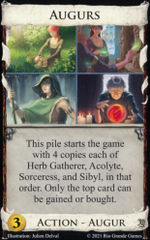
|
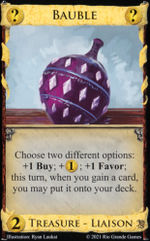
|
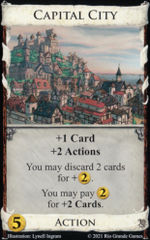
|

|
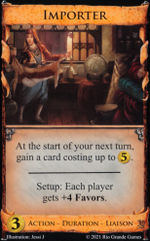
| |||||||||||||

|

|

|

|

| |||||||||||||
| Anvil | Expand | King's Court | Quarry | Rabble | |||||||||||||
| Landscapes and Additional Cards | |||||||||||||||||
| Platinum | Colony | Family of Inventors | |||||||||||||||

|

|

| |||||||||||||||
| Bank of Toadies [images] | |||||||||||||||||
|---|---|---|---|---|---|---|---|---|---|---|---|---|---|---|---|---|---|
| Broker | Marquis | Odysseys | Sycophant | Town | |||||||||||||
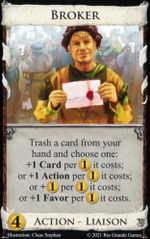
|
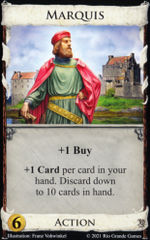
|
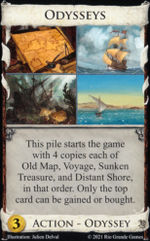
|
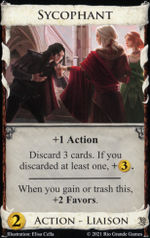
|
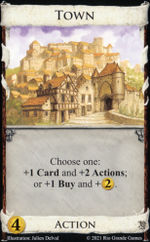
| |||||||||||||

|

|

|

|

| |||||||||||||
| Bank | City | Clerk | Investment | Vault | |||||||||||||
| Landscapes and Additional Cards | |||||||||||||||||
| Platinum | Colony | League of Bankers | |||||||||||||||

|

|

| |||||||||||||||
[edit] Prosperity & Plunder
| Pretty Trinkets [images] | |||||||||||||||||
|---|---|---|---|---|---|---|---|---|---|---|---|---|---|---|---|---|---|
| Figurine | Jewelled Egg | King's Cache | Rope | Silver Mine | |||||||||||||
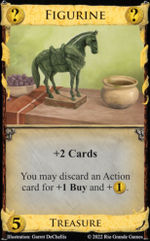
|
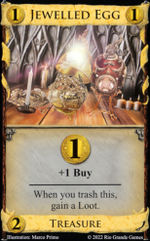
|
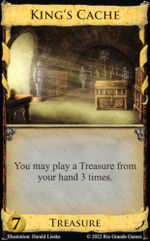
|
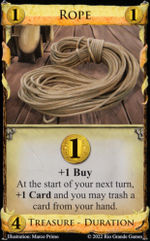
|

| |||||||||||||

|

|

|

|

| |||||||||||||
| Bank | Crystal Ball | Investment | Tiara | War Chest | |||||||||||||
| Landscapes and Additional Cards | |||||||||||||||||
| Trait for Rope Fated |
Platinum | Colony | |||||||||||||||

|

|

| |||||||||||||||
| Buying Happiness | ||||||||||||||||||||
|---|---|---|---|---|---|---|---|---|---|---|---|---|---|---|---|---|---|---|---|---|
| Cage | Mining Road | Pendant | Stowaway | Swamp Shacks | ||||||||||||||||
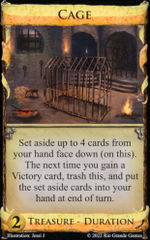
|
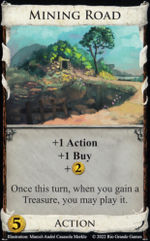
|

|
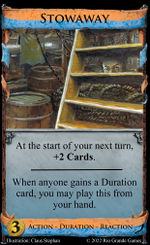
|
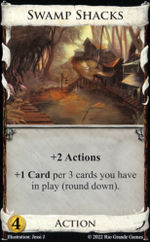
| ||||||||||||||||

|

|

|

|

| ||||||||||||||||
| Anvil | Bishop | Clerk | Magnate | Worker's Village | ||||||||||||||||
| Landscapes and Additional Cards | ||||||||||||||||||||
| Trait for Magnate Fawning |
Platinum | Colony | Looting | |||||||||||||||||

|

|

|

| |||||||||||||||||
